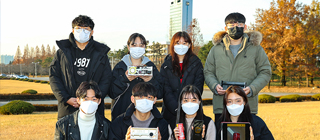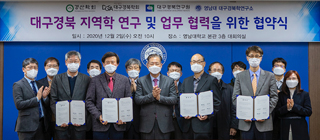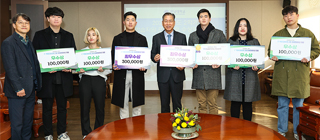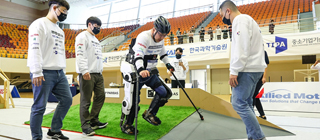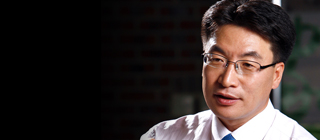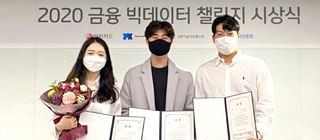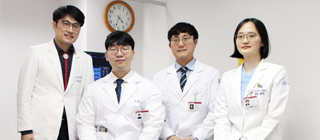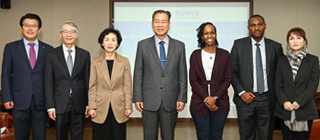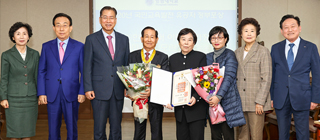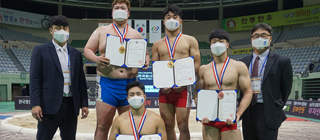-
Praises for the ‘Mobile Smart Braille Printer & App’ submitted to the creative general design contest ‘Creative idea’ converging and integrating various majors including information communication, mechanics, and business administration YU students win the grand prize for the second consecutive year [December 2, 2020] <’IM.DOT’ team of YU that won the grand prize at the ‘2020 Engineering Festival’ creative general design contest> (Bottom left to righ: Koo Joon-beom, Ji Joon-young, Koh Se-rim, Park Yu-na / top left to right: Kwon Hyuk-joon, Yang Sung-eung, Kang Min-ji, Han Kuk-young) YU students won the grand prize at the ‘2020 Engineering Festival’ creative general design contest. YU won the grand prize in last year’s contest and won again this year for the second consecutive time. In the 2020 Engineering Festival’s ‘creative general design contest’ held from November 23 to 27, about 150 teams participated, revealing their creative ideas. The ‘IM.DOT’ team (advisor Kim Young-tak) comprised of nine juniors such as Koo Joon-beom (23), Ji Joon-young (23), Koh Se-rim (22), Park Yu-na (21) and Yang Sung-eun (21) of the Department of Information and Communication Engineering, Kwon Hyuk-joon (24), Han Kuk-young (24) and Kang Min-ji (21) of the School of Mechanical Engineering, and Kim Kyung-hee of the Department of Business Administration won the grand prize and received the Minister of Trade, Industry and Energy Award. The work submitted by ‘IM.DOT’ was the ‘mobile smart braille printer & app (IM.DOT).’ They developed a mobile braille printer and application for the visually impaired to address their inconveniences to distinguish objects in everyday life. It has higher recognition rates than bar code scanners used when scanning items, and it adjusts the speed of voice messages to greatly improve convenience. When the item bar code is scanned through the ‘IM.DOT’ application, the detailed product information is voice notified. By synchronizing the ‘IM.DOT’ app with the mobile smart braille printer, it can be printed in braille immediately. By using the memo pad function of the ‘IM.DOT’ application, it is possible to print a message directly on the mobile braille printer, therefore, making it possible for it to be used by the visually impaired. ‘IM.DOT’ team leader Park Yu-na said, “Our team came up with this idea after reading an article explaining that most beverage vending machines in the market do not have braille and the braille indicated on products for sale only offer limited information, causing inconveniences for the visually impaired. Our team worked hard for six months to produce an application that can offer detailed product information to the visually impaired using a smart device and to build a mobile braille printer prototype. We hope that it will help the visually impaired to live a more independent life. I believe that with a little more revisions and supplementation of product bar code information linking, it is a technology that can be commercialized.” The ‘IM.DOT’ team applied for a patent for the newly developed ‘mobile smart braille printer.’ Meanwhile, the ‘2020 Engineering Festival’ is an event sponsored by the Ministry of Trade, Industry and Energy and co-hosted by the Korea Institute for Advancement of Technology and the Engineering Education Innovation Association and this year, it was held under the theme, ‘Engineering Challenge Week, Continuing Challenge.’ This event was held contact-free using online platforms such as homepage and YouTube due to the COVID-19 pandemic.
-
YU Daegu-Gyeongbuk Development Institute Signs MOU with expert research institutes such as the Daegu-Gyeongbuk Society Expected to build cornerstone for regional studies to strengthen and innovate regional competitiveness [December 2, 2020] <The four institutes of YU Daegu-Gyeongbuk Development Institute, Gyeongsan Society, Daegu-Gyeongbuk Society, and the Daegu-Gyeongbuk Development Institute’s Daegu-Gyeongbuk Studies Research Center signed an MOU for research cooperation in regional studies> (From left to right: Chief Park Seung-hee, Chairman Sung Gi-joong, YU President Sur Gil-soo, Chief Kwak Jong-moo, Chariman Choi Cheol-young) The YU Daegu-Gyeongbuk Development Institute (Chief Park Seung-hee) teamed up with expert research institutes and academic societies to conduct full-fledged research on regional studies. The four institutes of the YU Daegu-Gyeongbuk Development Institute, Gyeongsan Society (Chairman Sung Gi-joong), Daegu-Gyeongbuk Society (Chairman Choi Cheol-young), and the Daegu-Gyeongbuk Development Institute’s Daegu-Gyeongbuk Studies Research Center (Chief Kwak Jong-moo) signed an MOU for regional studies cooperation at the main conference room on the third floor of the YU main building on the 2nd. The four institutes agreed to cooperate in joint research for regional studies of Daegu and Gyeongbuk, mutually cooperate in work, and construct an industry-academic-research cooperation system. There has been a recent rise of interest in regional studies research in both academia and socially. These specialized research institutes agreed to team up and therefore, it is expected that a foundation for regional studies research will be provided to strengthen and innovate regional competitiveness. YU Daegu-Gyeongbuk Development Institute Chief Park Seung-hee (Professor of Korean Language and Literature) said, “With this MOU, we now have the basis for establishing a Daegu-Gyeongbuk regional studies research system and inter-institution cooperation,” while adding, “The four institutes will take the initiative to construct pan-regional research solidarity and cooperation system to carry out various regional study-related projects such as constructing a Daegu-Gyeongbuk regional studies research platform, regional archive, regional study education governance, regional study-based industry-academic-research cooperation system.” Meanwhile, at the YU Daegu-Gyeongbuk Development Institute that was opened in March of 2019, there are around 10 regional studies experts including professors and researchers conducting research and a variety of projects. It carries out regional demographics, urban regeneration, historical and cultural resource study and research activities, and also offers general education classes on Daegu-Gyeongbuk regional studies and Gyeongsan studies.
-
‘Extracurricular Learning Activity Contest’ awards for the second semester of 2020 Sharing and spreading self-development success cases with students Sharing outstanding works through the ‘Education Development Center homepage’ [December 3, 2020] <Winners of the IT Empowerment Program Presentation Contest> The YU Education Development Center (Director Kim Geun-ho) held the 2020 second semester learning-related program contest <IT Empowerment Program Presentation Contest) and <YU Learning Award> on November 26. The <IT Empowerment Program Presentation Contest> is an IT capacity contest published by making presentations containing self-introduction/employment portfolio and school/department/club PR (information). A total of 40 people participated in this contest. After the first PPT utilization review and second presentation ability review, one person was selected for the grand prize (Business Administration, Cha Seung-eun), three received second place awards (Special Physical Education Hwang Sung-hyun, Urban Planning and Engineering Yoo Sun-ho, Korean Language Education Lee Da-gyeong), and five were selected for third place (Electric Engineering Kim Yoon-hwan, Korean Language Education Yuk Tae-gyun, English Language and Literature Lee Jung-yeon, Biotechnology Shin Yoo-jung, and Korean Language Education Kim Eun-hye). Cha Seung-eun (21, Business Administration, junior), who won the grand prize, said, “I hope that many students of our university will use such programs as opportunities to demonstrate their abilities and skills.” The <YU Learning Award> is an extracurricular learning activity contest in which students participate in various school programs such as clubs, study groups, mentoring, internship, etc. and produces and shares their experiences and success cases in UCC format. In this contest, 22 works and 30 people participated and they were reviewed based on attractiveness of the work, content, and possibility for outreach of cases. The grand prize went to one team (Business Administration Choi Ji-ae, Chemical Engineering Ryu Ga-hyeon), and second place went to to students (Business Administration Park Hye-jin, Electrical Engineering Yang Hoo-seok), and three won third place (Urban Planning and Engineering Yoo Sun-ho, Chemistry and Biochemistry Shim Ji-min, Accounting and Taxation Ryu Hwa-hyeon). <YU Learning Award winners> Choi Ji-ae (19, Business Administration, freshman), who won the grand prize at the <YU Learning Award>, said, “My first year at college is with contact-free and online classes, but I was surprised and delighted that I could take part in various activities online.” The winning works for this contest can be seen at the YU Education Development Center homepage. URL ☞ http://ctl.yu.ac.kr/student/board.php?wd=10&menu_code=11 After the awards, the winners met with YU President Sur Gil-soo to talk frankly about college life such as career plans, classes, etc. YU President Sur Gil-soo said, “Our students also have the challenging spirit, passion and willpower of the Wright Brothers.” I hope that students will actively look for their paths even during the coronavirus pandemic.”
-
‘WalkON Suit’ co-developed by college, business, hospital, research center, etc. wins gold and bronze at Cybathlon 2020 Dep. of Robotics and Intelligent Machine Engineering Professor Choi Jung-soo leads ‘robotic movement general/control technology’ research Defeats advanced robotics countries such as Switzerland and USA with unrivaled technology Goal to commercialize wearable robots for the disabled... Possible to apply in various sectors such as general and industrial-use [November 16, 2020] <‘Cybathlon 2020’ match> (Dep. of Robotics and Intelligent Machine Engineering Professor Choi Jung-soo (first on right) and player Kim Byung-wook) The Korean ‘Ironman’ robot ‘WalkON Suit’ that applied the technologies of YU Dep. of Robotics and Intelligent Machine Engineering Professor Choi Jung-soo (34) topped the world at Cybathlon 2020. Professor Choi participated in the first Cybathlon as part of KAIST Professor Kong Gyeong-cheol’s team held in Switzerland in 2016 and won third place. At this second tournament, Kim Byung-wook (47, male) and Lee Joo-hyeon (20, female) represented Korea, winning first and third place, and thereby demonstrating the world’s best research capacities. <Professor Choi Jung-soo during an interview with the press at Cybathlon 2020 (first on right)> Cybathlon combines the words ‘cyborg’ that means robotic man and the Latin word ‘athlon’ that means contest, and it is the first integrated robot-disabled person international Olympics in the world. Matches are held with people with disabilities completing missions while wearing bioengineering assistance devices like robots. Over 50 teams from 20 countries participated in six matches at the Cybathlon 2020. Team Korea that included Professor Choi participated in the wearable robot matches to compete with 12 players from eight countries including the US and Switzerland. Due to COVID-19 this year, the competitors installed stadiums in 33 regions around the world and competed through multiple-relay methods. The wearable robot competition involved a disabled player with complete lower body paralysis outfitted in a wearable exoskeleton robot to complete missions such as getting up off a sofa, stacking cups, passing zig-zag obstacles courses, walking on rough terrain, climbing up and down stairs, walking on side-ways inclines, and passing hills and doors. The rankings were given based on the accuracy of completing missions, time, etc. Professor Choi’s team member Kim Byung-wook completed all missions in 3 minutes and 47 seconds and Lee Joo-hyeon finished in 5 minutes 51 seconds, demonstrating unrivaled technologies and thereby winning the gold and bronze medals, respectively. The silver medal went to the Swiss team who completed the mission in 4 minutes 40 seconds, and the US team came in fourth with a record of 6 minutes and 51 seconds. <Cybathlon 2020 ‘Walking Downhill’> <Cybathlon 2020 ‘Climbing Up Stairs’> <Cybathlon 2020 View of Venue> Professor Choi cooperated with the KAIST research team as well as the top research teams in different sectors of industry, academic and research such as Angel Robotics, Severance Rehabilitation Hospital, Rehabilitation Engineering Research Center to develop WalkON Suit 4. In particular, in addition to the robot structure, electronic circuits, and control algorithms, but also major parts such as the motor decelerator were proprietarily developed for the WalkON Suit 4. Excluding some parts, most of it was completed with domestic technologies. Professor Choi led the movement generation section such as software and control technologies, etc. related to robot movement, which is a core technology of WalkON Suit 4. In order for a disabled person to actually utilize a robot, that person must be able to perform complex movements while riding the robot such as straight, curved and rugged terrain walking, climbing up and down hills and stairs, and passing doors. Professor Choi is currently developing various motion generation algorithms and precision control to configure such precise movements and conducting research to apply it in robots. Professor Choi said, “The primary goal of my research is to help disabled persons who are paralyzed from the waist down to lead a normal life. With the awards from this contest, Korea’s wearable robot technologies were recognized to be the world's best. I want to contribute to improving the quality of life for those with paraplegia through continued collaborative research with relevant institutes such as industry, academic and research,” and added, “In the case of wearable robots, they are rapidly spreading worldwide not only for the disabled, but also for the military, police, firefighting, and industrial use. It is now a time that we must preemptively develop technologies to gain technologies in advance and to lead the world market, but also a time to revamp the systems involved with it.” Professor Choi was appointed as a professor at the Department of Robotics and Intelligent Machine Engineering in March of 2019 and is a young scientist who is leading domestic robot research. He won the presidential award at the 2017 Korea Invention Patent Exhibition with the ‘multi-leg walking robot’ and also received the Rising Scientist Award in last year’s regular academic conference of the Institute of Control, Robotics and Systems.
-
‘Top 1% for thesis citation’ in the three fields of math, computer science, and engineering Only 9 researchers in the world selected for 3 or more fields... Only in Korea Professor Park’s student also selected for two consecutive years... Teacher and student recognized as global researchers [November 19, 2020] YU Department of Electrical Engineering Professor Park Joo-hyun (52) was selected as a world’s top 1% researcher once again. He was selected as the world’s most influential researcher for six straight years from 2015 Clarivate Analytics, a global information analysis company, announced the ‘most influential researcher in the world in 2020’, or ‘top 1% most frequently cited theses (Highly Cited Researchers, HCR),’ on the 18th. Professor Park was again selected as the world’s top 1% researcher in the three fields of mathematics, computer science, and engineering. There are only 9 people in the world selected as top 1% researchers in more than fields. Professor Park was the only one selected from Korea. Being selected as an HCR in multiple fields means that the researcher exhibits influence in a wide range of areas, and it is a recognition as unparalleled research capacities even among world acclaimed researchers. There was a total of 6,167 people from over 60 countries around the world who were named in this year’s HCR. There are a total of 41 researchers in Korea who were selected as HCR, and 39 of them are Korean. Professor Park was the only one in Korea to be selected in three different fields, and three others were selected for two fields. Included among them are the global scholar in the nano-sector who received attention as a candidate for the Nobel Prize this year, Seoul National University Seated Professor Hyun Taek-hwan who was named in two fields. HCRs are selected from a total of 22 fields comprised of 21 sectors in natural and social sciences, and 1 cross-field (researcher with high impact on researchers in various fields). Professor Park Joo-hyeon’s student and professor at Jeonbuk National University Department of Electronic Engineering, Lee Tae-hee was also selected for the second consecutive year in the cross field sector. Professor Lee earned her bachelor’s, master’s and doctorate’s at YU and served as a post-doctorate researcher at YU and Deakin University in Australia, and was appointed as a professor at Jeonbuk National University in September of 2017. The teacher Professor Park and student Professor Lee were both recognized as global researchers. Clarivate selects HCR researchers based on analytical information conducted by its subsidiary institute ISI (Institute for Scientific Information) data and measuring bibliography experts and data scientists. HCR and Nobel Prize winner prediction programs, etc. are announced every year, and it has close cooperative relations with colleges around the world, companies, and public institutes. A total of 26 Nobel Prize winners including three winners from this year were included in the 2020 HCR list. HCR은 과학 및 사회과학 등 21개 분야와 크로스필드(Cross Field, 다른 여러 분야 연구자에게 높은 영향력을 준 연구자) 1개를 포함해 총 22개 분야에서 선정한다. 박주현 교수의 제자인 전북대 전자공학과 이태희 교수도 지난해에 이어 2년 연속 크로스필드 부문에서 선정됐다. 이 교수는 영남대에서 학사, 석사, 박사를 취득한 국내파로 영남대와 호주 디킨대학교(Deakin University) 박사후연구원을 거쳐 2017년 9월 전북대 교수로 임용됐다. 스승인 박 교수와 함께 세계적인 연구자로 발돋움했다. 클래리베이트는 산하 기관인 ISI(Institute for Scientific Information)의 데이터 및 계량 서지학 전문가, 데이터 과학자들이 수행한 분석 정보를 바탕으로 HCR 연구자들을 선정하고 있다. 매년 HCR을 비롯해 노벨상 수상자 예측 프로그램 등을 발표하며 전 세계 대학, 기업 및 공공기관들과 긴밀한 협력을 맺고 있다. 2020년 HCR 명단에는 올해 노벨상 수상자 3명을 포함해 총 26명의 노벨상 수상자들이 포함되어 있다.
-
Park Dae-young and Noh Yoo-bin (YU) and Kim Deok-hyeon (Kyungpook National University) Alliance, ‘CUCCI’ Team takes first place Analyzed big data to develop ‘gentrification index’... Predicting gentrification regions Provide preemptive systems and can use for business marketing [November 23, 2020] <CUCCI, the YU and Kyungpook National Univ. alliance team that won the grand prize at the ‘2020 Financial Big Data Challenge’ contest> (From left to right: Noh Yoo-bin, Kim Deok-hyeon, Park Dae-young) This regional college team comprised of students from YU and Kyungpook National University won the grand prize at the ‘2020 Financial Big Data Challenge’ held for the general public. They are the CUCCI Team comprised of YU’s Park Dae-young (25, Business Administration, senior) and Noh Yoo-bin (24, International Economics and Business, graduated) and Kyungpook National University’s Kim Deok-hyeon (24, Statistics, senior). This contest that was co-hosted by the Ministry of Science and ICT, National Information Society Agency, and BC Card was ‘Industrial and Commercial Growth Prediction Ideas Using Consumption Data.’ The participants used financial big data to submit analysis results on ▲manufacturer investment appeal (stock prices) through consumption data and manufacturer revenue analysis per item ▲real estate market prices through local consumption data and corporate revenue analysis, and ▲gentrification predictions using local consumption data and real estate prices. A total of 275 teams and individuals took part in this contest and after first document reviews on the excellence, commercialization, and social effects of ideas, seven teams that entered the finals on October 29 gave presentations that were reviewed, and a total of five teams were awarded. The CUCCI Team took first place to win the grand prize. The CUCCI Team predicted the commercial gentrification region based on ‘rising commercial districts, gentrification predictions.’ They collected BC Card financial big data platform data, number of foreigners living in Seoul, portal site search frequency, etc. to come up with main keywords that affect gentrification through social media network analyses. They were used as collected data to develop a gentrification index, and after conducting local status surveys for the predicted areas using the index, they verified the appropriateness of the index, thus receiving good evaluations. They said, “By using the ‘gentrification index’ developed based on analysis of big data, it will be possible to come up with countermeasures against gentrification that had negative impact,” and added, “After identifying the gentrification prediction region, it will be possible for the government to preemptively apply lease ceilings, or in the case of credit card companies, utilize it in a variety of fields such as in marketing strategies to promote credit card transactions.” YU Department of Business Administration senior Park Dae-young said, “It was quite difficult to study big data as I did not major in it. I sat in for special lectures on big data analysis provided by the school and I was able to learn the fundamentals through the big data utilization center of the Daegu Digital Industry Promotion Agency. Whenever I hit a wall while preparing for this contest, I spoke with Professor Kim Byung-soo to seek advice and it was very helpful. It has not been very long since I started studying big data, but I think this contest served as an opportunity to gain more insight on the utilization potentials of big data.” Meanwhile, the awards ceremony was held at the Innovation Academy in Gaepo-dong of Gangnam-gu, Seoul on November 11.
-
College of Medicine seniors Lim Tae-hoon, Lee Dong-sung, Choi Se-ra (Advisors Endocrinology Professor Moon Jun-sung, Professor Jung Seung-min) Research on discovery of diabetes and kidney disease prediction factors published in SCIE paper When brachial-ankle pulse wave velocity above 1,800cm/s, higher risk of diabetic kidney disease [November 23, 2020] <YU College of Medicine Endocrinology and Metabolism Class Research Team> (From left to right: Professor Moon Jun-sung, students Lim Tae-hoon and Lee Dong-sung, Professor Jung Seung-min) The ‘diabetes and kidney disease prediction factor discovery’ research paper led by YU College of Medicine (Dean Yoon Sung-soo) students was published in an international academic journal. They are College of Medicine seniors Lim Tae-hoon, Lee Dong-sung, Choi Se-ra (Advisors Endocrinology Professor Moon Jun-sung, Professor Jung Seung-min) The research team conducted retrospective analysis on diabetes patients that were examined at YU Medical Center for about three years and found that the group with a brachial-ankle pulse wave velocity of 1,800cm/s or higher with peripheral arteriosclerosis had about 8.5 times higher risk of getting diabetic kidney diseases than the control group. The research results were clinically significant in that patients with high risk of dialysis or kidney transplants among the vascular complications of diabetes can be predicted to prevent it through assertive treatment. Lim Tae-hoon, the primary author, said, “I wanted to conduct clinical studies that could help the actual medical field, and it is a pleasure that we were able to obtain meaningful results through the help of fellow students and professors. I want to continue to work in medicine and research that help patients after earning my doctor’s license.” Professor Moon Jun-sung who was the advisor for this study said, “I hope that the research results that they achieved by participating passionately despite their busy schedule to prepare for national exams and lab work will serve as a great opportunity for growth as doctors in the future. We will continue to do our best to foster doctors with research capacities in the future.” This paper was published on the October 30 issue of <Frontiers in Medicine, impact factor (IF) 3.10> that is in the top 17% of the Medicine, General & Internal international academic journal.
-
Discussions on national development plans of Rwanda through ‘Saemaul Undong’ Good reviews on local activities of African graduates from the Park Chung Hee School of Policy and Saemaul Agreed to discuss follow-up activities to MOU such as opening Saemaul Department at local universities in Rwanda [November 6, 2020] <YU and the Rwandan Ambassador to Korea held discussions for the localization of the ‘Saemaul Undong’> Rwandan Ambassador to Korea Yasmin Amri Sued visited YU on the 6th to discuss national development plans for Rwanda through the ‘Saemaul Undong’. The purpose is to transfer YU’s knowhow on plans to apply the Saemaul Undong to developing countries and to share the economic development experience of Korea through the Saemaul Undong. Ambassador Yasmin, who made his first official visit to YU since being appointed as ambassador in October 2019, met with YU President Sur Gil-soo, Park Chung Hee School of Policy and Saemaul Dean Kim Gi-soo, and Global Saemaul Development Network (GSDN) Chairman and Professor of Saemaul and International Development Choi Wae-chul where he said, “I believe that Korea’s Saemaul Undong can contribute greatly to the development of Rwanda.” and added, “I hope our two institutes will maintain close cooperative relations for this in the future.” YU also introduced success cases of African graduates of the Park Chung Hee School serving as public officials back in their home countries where they proposed various policies and pursued projects by applying the Saemaul Undong. Ambassador Yasmin said, “I hope that there will be more international students from Rwanda studying at the Park Chung Hee School of Policy and Saemaul.” The Rwandan embassy in Korea will actively support the student selection process.” YU introduced the dual diploma program for Saemaul with Western University of Cambodia and also proposed establishing a Saemaul department at universities in Rwanda. YU also shared the direction for the global Saemaul project such as constructing a global network among alumni of the Park Chung Hee School, which the ambassador showed great interest in. YU and the Rwandan embassy agreed to enter an MOU for the installation of a Saemaul department in Rwanda and for selecting students for the Park Chung Hee School through further discussions in the future. <From left to right: Rwandan Ambassador to Korea Yasmin Amri Sued, YU President Sur Gil-soo, Park Chung Hee School of Policy and Saemaul Dean Kim Gi-soo> YU President Sur Gil-soo said, “YU’s achievements in education and research that paved an academic system for Saemaul studies have received international recognition. Every year, government and public institute employees, international developments, etc. from developing countries around the world come to YU to learn about the Saemaul Undong and international development.” He added, “I am confident that the specialized knowhow and knowledge that YU has accumulated will contribute to the development of Rwanda. I hope that starting with the Saemaul and international development sector, exchange will be expanded to various fields.” Since 2012 when the YU Park Chung Hee School of Policy and Saemaul received its first new students, a total of 729 students from 68 countries enrolled, and up until now, 626 earned master’s degrees in Saemaul studies. Among them, 39 are from Rwanda, accounting for about 6% of the total. This is the highest number following Indonesia with 56 and the Philippines (39). This represents just how much interest Rwanda has on the Saemaul Undong. Most of the international students at the Park Chung Hee School are professionals working for the government, financial institutes, press, and legal sector who came to YU to learn about the Saemaul Undong. That is why the Rwandan ambassador to Korea is so keenly interested in this. Back in April of 2018, the former Rwandan ambassador to Korea visited YU to give a special lecture to international students at the Park Chung Hee School. The new ambassador’s visit to YU is an extension of this, and there are growing anticipations of a Rwandan Saemaul Undong to occur.
-
YU Department of Mechanical Engineering class of ‘64 donated 6.2 billion KRW in development funds for the alma mater and juniors Recognized for contributions to the development of education in Korea [November 4, 2020] <Korea Former Chairman Lee Jong-woo (fourth from left) received the ‘Order of Civil Merit, Peony Medal'> Korea Former Chairman Lee Jong-woo was honored by receiving the ‘Order of Civil Merit, Peony Medal’. The ‘Order of Civil Merit’ is given to those with clear merits that contributed to improving the welfare of citizens and national development in the politics, economics, sociology, education, and academic sectors in the Republic of Korea. The Peony Medal is the second highest order of civil merit following the Rose of Sharon Medal. Chairman Lee was recognized for his contributions to the development of education in Korea. Chairman Lee, an alumnus from the YU Department of Mechanical Engineering class of ‘64, donated real estate worth about 5 billion KRW in May of last year as development funds to his alma mater, YU. The university is using the development funds donated by Chairman Lee for renovating the science library, which was a key project of YU. Furthermore, Chairman Lee founded the ‘Songam Scholarship Association’ for juniors having difficulties with studies since 2002 where he donated about 1.2 billion KRW in scholarship funds. He thus donated a total of about 6.2 billion KRW in development funds for the alma mater and juniors. He also enacted the KAIST ‘Songam Future Scholar Outstanding Research Award’, continuously providing support for developing the domestic university education and research capacities. At 1:30 p.m. on the 3rd, the medal bestowal ceremony was held for Chairman Lee Jong-woo. At this ceremony were present the Yeungnam School Foundation Chairperson Han Jae-sook, YU President Sur Gil-soo, YU General Alumni Association Senior Chairman Koh Dong-hyeon, as well as former governor of Gyeongsangbuk-do who also served as the YU General Alumni Association chairman to congratulate Chairman Lee receiving the medal. Chairman Lee, who received a certificate and medal at the ceremony, said, “All I did was share a little with my alma mater and juniors because I wanted to repay what I received from our society and university. It is a great honor to receive this medal from the nation.” He added, “Practicing sharing even at a small level can serve as a lubricant to develop different parts of Korea. I hope that my juniors studying at YU can also do their roles in society and practice sharing." <Korea Former Chairman Lee Jong-woo (left) and Mrs. Shin Gwang-soon (wife of Chairman Lee)> Meanwhile, Chairman Lee also received a plaque after being selected as a member of the YU Chunma Honor Society on October 14. Chairman Lee not only made huge donations to YU’s development fund, but also serves as a director for the Yeungnam School Foundation, thus being recognized for his contributions to the development of higher education in Korea and to YU.
-
Takes 3 golds and 1 bronze in individual matches at the 57th Presidential National Ssireum Championship Park Chan-joo who is ranked first in the Jangsa division scheduled to join the Taean-gun Office Ssireum Team [November 2, 2020] <YU Ssireum Team that swept 3 divisions at the ‘57th Presidential National Ssireum Championship’> (Source: Korea Ssireum Association) (From top left to right: Coach Lee Yong-ho, Park Chan-ju, Lee Hyeon-seo, Jung Tae-hwan, Head Coach Heo Yong, Jung Jong-jin) The YU Ssireum Team (Head Coach Heo Yong) once again proved that they are the top collegiate team by winning four medals, including three gold medals, at the ‘57th Presidential National Ssireum Championship’ held at the Andong Gym in Andong, Gyeongsangbuk-do. At this tournament, the YU Ssireum team took first place by winning three out of seven weight divisions. YU kicked off their role by Lee Hyeon-seo (19, Department of Special Physical Education, freshman) winning the gold medal in the Cheongjang class and then Jung Jong-jin (20, Department of Special Physical Education, sophomore) won the gold in the Yongjang class, and Park Chan-ju (Department of Special Physical Education, senior) also won the gold in the Jangsa class. Also, Jung Tae-hwan (20, Department of Special Phsyical Education, sophomore) took third place in the Cheongjang class. In particular, Park Chan-ju, who took first place in the Jangs class, was ranked first place in the Jangsa division for four straight years as the unrivaled collegiate champion and dominated all other opponents. Four teams around the nation completed to scout Park Chan-ju as he will be graduating next year. Park Chan-ju chose to join Taean-gun Office Ssireum Team (Head Coach Kwak Hyun-dong). Taean-gun Office Ssireum Team Head Coach Kwak Hyun-dong (YU Department of Phsyical Education class of ‘83) and Coach Lee Han-shin (YU Department of Sports Science ‘99) also graduated from YU and it is expected that with Park Chan-ju joining the team, talents from the YU Ssireum Team will continue to perform in semi-professional teams. Park Chan-ju said, “My skills improved a lot since training with the Taean-gun Office Ssireum Team over the past four years. There were some teams that offered better signing bonuses and salaries, but I chose the team that would help me grow as a ssireum athlete as I graduate from college and take my first step out into society. I will do my best for the remainder of the season to make sure that we win the group match before graduating to finish my college career on a high note.”
